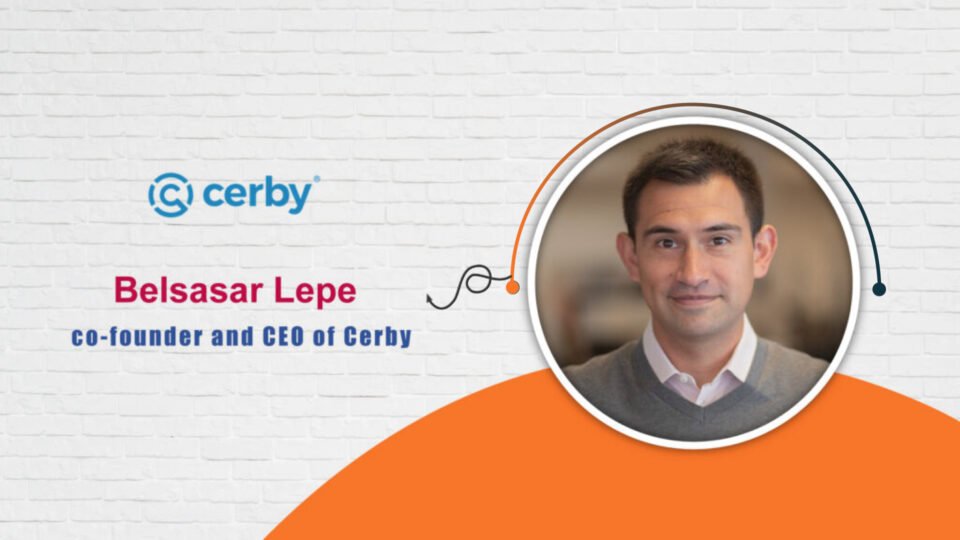Belsasar Lepe shines light on the importance of cybersecurity in the marketing sector. He expresses the need for marketers to move according to the need of the industry to mitigate risks.
1. Tell us about yourself and how you came to be in your current role as the CEO at Cerby?
I am a second time founder who originally started out as an engineer at Google and have been in the
start-up space for over 15 years. When considering joining or starting a company, I look for a few
key factors: a talented founding team, a solid TAM (total addressable market) and a problem that
you can see potential customers for.
In Cerby, I found that all three were “there” in spades, starting first with the founding team and
when my co-founder Vidal, as well as one of our advisors highlighted the opportunity behind Cerby,
it was a no-brainer for me to dive in and try to put to use what I’d learned in my previous roles as a
founder. More importantly, I love building teams as much as I love building products and when you
found a company, you get to do both at a speed that is challenging, fun, and never boring
2. Can you tell us about your journey into this industry?
It wasn’t until recently that I realized that in my last several roles, what attracted me to eachAt Ooyala, it was enabling anyone to be a broadcaster/programmer online through
respective role was the opportunity to accelerate the accessibility of a certain technology to a new
demographic.
the simplification of video. In my last role, it was democratizing access to AI so that any knowledge
worker could automate data-centric tasks automatically. At Cerby, it is making security accessible to
a new generation of “IT workers”, especially considering we are all now increasingly doing more IT
work than we’ve ever done before.
So, in many ways, Cerby is a continuation of something I’ve been doing for well over 15 years. The
fact it is in a new industry – security – makes it all the more intellectually stimulating and challenging .
3. What are some of the unique lessons you have learnt from analysing your customer behaviour?
Since we founded the company last year, we have had the opportunity to meet with hundreds of
prospective customers and the number one thing that has blown us away is how much more security
aware every employee and dept head is relative to where they were even two years ago. This space
is moving incredibly quickly and only continues to accelerate with the importance of digital security.
But this security awareness is the result of serious frustration – most users find they are having to
constantly choose between convenience and security. Ironically, this is actually one of the major
motivators behind Shadow IT – it is easier to just go and start using that app without letting IT know.
Through research, we know that given choice, most users will choose convenience. The fact that our users often have to make this crazy tradeoff is a central premise for how we have approached the development of our product.
4. Recently Cerby was in the news for closing $3.5 M funding. Can you tell us how are you planning to use this?
We’ve used this initial round of funding to bring our product to market in the form of a closed beta
(followed by a limited release later this year) and are working with several design partners as part of
our closed beta. We have hired out an excellent team with deep security and user experience
credentials and are incredibly excited about the journey ahead and accomplish great things in 2021!
5. What are the applications or rather opportunities you seek to have with your product?
We see two core opportunities:
To take the load off security and IT teams, who are often blindsided by all of the applications
they aren’t aware of (Shadow IT)
To enable all employees to play a role in protecting themselves, their data, and their
businesses from internal and external security risks
6. How do you think Cyber Security technology is upgrading the marketing sector?
Historically, it hasn’t. Cyber security in the marketing sector has been an impediment and met with
resistance. Marketing leaders and marketers need to be able to move at the pace of business but
historically, security tools have added friction instead of enabling convenience. And this isn’t solely
focused in marketing – we see this across finance, product, and sales.
We often see the command and control approach to IT hinder the ability for individual departments
to move quickly and believe there is a happy path where individual departments can continue to
move quickly while not exposing their businesses to new security risks. This has the added benefit of
giving IT teams, which are already stretched thin in this remote worker world, the ability to securely
push off app administration work to their peers and stakeholders in other organizations. We want to
empower security to be an “everyone” focus and not just those in IT.
7. What work-related hack do you follow to enjoy maximum productivity?
I’m a long time intermittent faster (I’ve been doing it for nearly 20 years) and if you can manage it, I
strongly recommend it. One of the core benefits, which happens to work well with start-up life, is it
gives me more time in the morning and middle of the day to focus on work. Generally, I eat once
every day at around dinner time. I also recommend that one is creative about how you get your
thinking time in, even if it is a run or workout in the middle of the work day. Working from home has
resulted in a more fluid work day. This can definitely have downsides but for me, the positives far
surpass it. I no longer have these rigid workday/at home boundaries; if it is the middle of the day
and you need to think through some gnarly problem – double up and go for that run while you chew
on the problem. Not only is working from home more productive but it’s better for the
environment and one’s prioritization of time.
8. What are some of the major developments being planned at Cerby in the next couple of years?
We are still in stealth mode so we unfortunately need to be mysterious about specifics but for us, we
are very excited about technology we’ve developed to help make security EVERYONE’s business.
We know this requires a pretty big shift in how security products are developed as historically, you
only had IT and sec ops teams caring about security. In this remote world where everyone is, to
some extent, their own IT dept, it becomes necessary to rethink how an organization can enlist ALL
of their employees to help keep their applications, data, and employees safe.
It is with that spirit and determination that we are focused on developing some revolutionary
products to tackle this concept.
9. Please share a recent piece of content (can be a video, a podcast, a blog, a movie or a webinar) that resonated the most with you with respect to Cyber Security or your work in general?
This is from of our advisors, Varun Badhwar:
https://podcasts.apple.com/us/podcast/zero-to-exit/id1535890939?i=1000494794277
As a seasoned security executive and entrepreneur, he absolutely nails it in terms of the trials and
tribulations founders in the security space encounter. Varun is a very wise entrepreneur and
executive and we are lucky to have him as an advisor.
10. What is your go-to strategy that brings technology and the human side of marketing together?
In security, try to avoid the tech speak (which is admittedly super hard for me).In this world where
the group that needs to care about security has gotten much much bigger – as we are all now
basically our own IT dept – you need to think very differently about how to connect with a new
security buyer
I do this by thinking about things in terms of that relative we all have who isn’t super technically
savvy. Can you explain it in a way your grandmother would understand? Can you tell the story of
your product in a way that this relative would care about it?
Take the time to test your story and value proposition with multiple personas to validate your
assumptions. The biggest mistake that a marketer and new company can make is the fear of pivoting
and scrapping an idea, campaign, slogan etc. Start-ups move quickly and your marketing efforts
need to keep up.
11. What is the one quote that has stayed with you throughout your professional life?
Employees don’t leave companies, they leave teams, team mates, and managers. This has always
stuck with me because it highlights how critical managing and an inspiring team culture is. It also
underlines the importance of investing time early on to build the foundation that will keep your
employees engaged and motivated
For more such updates and perspectives around Digital Innovation, IoT, Data Infrastructure, AI & Cybersecurity, go to AI-Techpark.com.

Belsasar Lepe
Co-Founder & CEO at Cerby
Belsasar (Bel) is co-founder and CEO of Cerby. He previously was Head of Product at Impira, where
he led the company’s Product Life Cycle, helping drive a 4x increase in revenue. Prior to his role at
Impira, Bel was co-founder and CTO at Ooyala where he led a global product, design, and
engineering team of 300+ Ooyalans spanning five countries and seven offices. Ooyala achieved two
successful exits totaling over $440M. Bel began his career as an engineer at Google working on
Enterprise Collaboration products and studied Computer Science at Stanford University. He is an
active advisor and investor in start ups, with a specific focus in Latin America.

